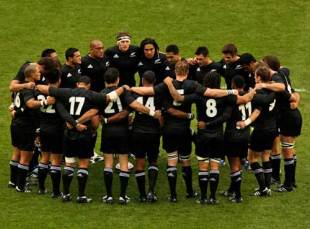|
Comment
All Blacks back on top of the world
Huw Turner
December 1, 2008

The 2008 All Blacks have entered the record books after completing an undefeated tour of Europe and not conceding a Test try along the way
© Getty Images
Enlarge
Three years - 2000, 2004 and now 2008. For the global sporting audience, years designated for Olympic celebration. But for those who follow the ebb and flow of worldwide rugby competition, years which have followed professional-era Rugby World Cups. Rugby World Cup tournaments to which the New Zealand All Blacks travelled as clear favourites, and from which they retreated, bemused, befuddled and beaten, having snatched defeat from the jaws of victory. 2000, 2004 and now 2008 - years in which the All Blacks re-grouped, regained their composure and reasserted themselves as the world's leading Test playing side. Apart from blemishes against the Springboks in Dunedin and the Wallabies in Sydney (defeats which were handsomely avenged subsequently), the All Blacks have despatched all serious competition in 2008. As we look back a year and wonder how on earth they came unstuck against the French in Cardiff, we can also begin to look ahead and speculate on their chances of Rugby World Cup success, at home, in 2011. Or perhaps it would be foolish to look that far ahead. Perhaps such foolishness has fed the perceived arrogance with which All Black squads have travelled to the UK and Ireland for RWC'99, to Australia for RWC'03 and then to France, Scotland and Wales for RWC'07. Perhaps we should simply enjoy the moment, identify the reasons for All Black progress in 2008 and acknowledge that Graham Henry has re-established the international status quo. This year was always going to be a year of rebuilding. After losing the likes of Aaron Mauger, Luke McAlister, Chris Jack and Carl Hayman, not to mention countless others who in the past might have provided cover in depth that had to be Henry's priority. So whilst this process inevitably offered opportunities for the previously untried, the winners were ultimately individuals making a return to the Test scene and benefiting from continuity of selection, the lack of which undid the 2007 Rugby World Cup campaign. I am thinking here of Jimmy Cowan, who played his best Test against England and who appears to be putting his previous off-field excesses behind him; Jerome Kaino, blooded back in the days of John Mitchell's pre-2003 Rugby World Cup regime; Ma'a Nonu, not a typical All Black second five eighth, but nonetheless maturing into the position and filling it with skill and menace; Piri Weepu, a discard with the mental fortitude to get on with his game and wait for his opportunity. In the process he will keep Cowan honest. Isaia Toeva remains a work in progress, but his latest rehabilitation suggests that he will be a force, perhaps as a replacement for Mils Muliaina, as will young lock Anthony Boric and flanker Kieran Read. The locking positions remain a cause for concern, not withstanding the excellent form of Ali Williams and Brad Thorn. The former is likely to be around for a few years yet, the latter probably not. Tony Woodcock has emerged as the world's leading loosehead prop, indestructible in the scrum, deceptively nimble in the loose. Neemia Tialata is making steady progress on the other side of the scrum, with able support from John Afoa, while Keven Mealamu, Richie McCaw and Rodney So'oialo are all in the form of their lives. Outside the scrum, much the same can be said about Dan Carter, Mils Muliaina, the returning Joe Rokocoko and the underrated Conrad Smith. As ever, the All Blacks' secret is that however good the individuals, and they are very good indeed, the sum of the parts exceeds. They play with collective ferocity, technical accuracy and expertise; they play with an organised and ruthless physical control, best typified in overcoming that excellent first half challenge from Wales. They are expected to win, they expect to win and this thread of expectation runs through every All Black side there ever was. As the All Blacks processed triumphantly through the United Kingdom and Ireland, a great deal of energy was generated around the rights and wrongs of the haka. Much of the comment I read, some of it provided by individual All Blacks, was nonsense. For me the final words have been provided by Dr Pita Sharples, reported in the New Zealand Herald on the day of the England v All Black Test. Sharples is one of the co-leaders of the Maori Party, the Minister of Maori Affairs and an acknowledged expert in the haka and other Maori protocols. He was reported as having 'applauded the silent treatment the Welsh dished out last weekend.' He added, 'We really respect that ... it was a very Maori thing to do. The Welsh basically said this is our turf, you do your haka, but we won't move until you've retired, this is our land - it was an excellent response.' © Scrum.com
|
Live Sports
Communication error please reload the page.
-
Football
-
Cricket
-
Rugby
-
- Days
- Hrs
- Mins
- Secs
F1 - Abu Dhabi GP
Abu Dhabi Grand Prix December 11-131. Max Verstappen ()
2. Valtteri Bottas (Mercedes)
3. Lewis Hamilton (Mercedes)
4. Alexander Albon ()
5. Lando Norris ()
6. Carlos Sainz Jr ()
-
ESPNOtherLive >>
Snooker - China Open
Tennis - Miami Open

